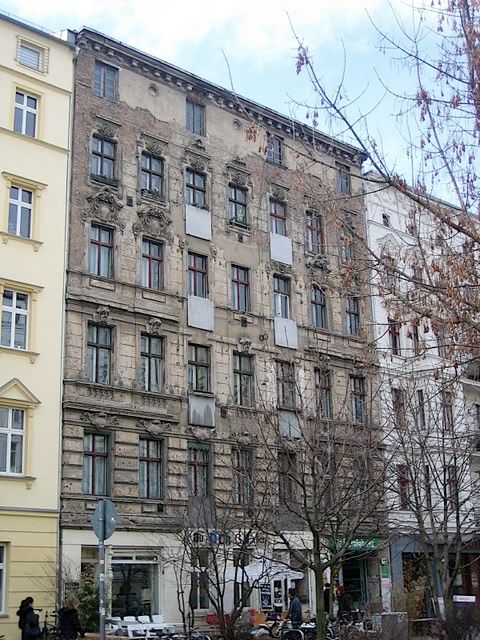My winter breaks tend to mean a few things: I ever so briefly join the cult of domesticity (baking, cooking, knitting, cleaning, organizing-generally being a richtig gut Hausfrau), I do all the cultural things I have missed out on (museum visits), and I hear from my lovely vermieterin in Berlin.
I spent August through December of 2007 living and studying in Berlin. While there I stayed with this absolutely fascinating woman, Helga, who was my vermieterin. While coldly defined at 'landlord', I use it as a particularly warm term. She tolerated my initially pitifully slow and poorly pronounced German and is more responsible for my current fluency than anything else. In exchange I beat her one temperature of burning oven into submission to make thanksgiving dinner (thanks KaDeWe for imported American food, including cranberry sauce in a can!), and introduced her to my version of homemade mac and cheese. She spoke little to no English, but wanted to learn some. I mainly enjoyed trying to get her to say 'squirrel'. It was not a rousing success.
Helga has lived in east/East Berlin all her life. She has worked for the government in its various forms over the years and now works as an adviser for Die Linke and the Berlin Parliament. Our apartment was in a unique neighborhood in Berlin, Prenzlauerberg. Originally the section of the city for the laboring population, in the 1980s it was a focal point of action against the GDR's policies. Now it's a strange mix of hippies, yuppies that used to be hippies, their young children...and Helga. This is where we lived:

44 Oderberger Straße. WWII bullet holes and all. I lived on the 5th floor. Excellent exercise, but annoying with a weeks worth of groceries. The cafe sold waffles and ice cream and the whole building smelled of it all day long (believe it or not, I never did get a waffle, something to do when I get back!). It was one of two on the street that had not been renovated. I often had to get through city bike/walking tours to get inside. These tours would narrate the horrors of living in the GDR and the typical lives of their citizens, as though my poor little apartment building embodied all that was evil/downtrodden/totalitarian/oppressive in the East German regime. I normally rolled my eyes and trudged up the stairs to an apartment that would make Erich Honecker wrinkle his nose.
In this year's Christmas greetings, Helga informed me that the apartment building was being modernized. I am deeply saddened by this news. Buildings tell a lot of history, and the buildings a city chooses to keep or destroy mirrors the history that they choose to keep or destroy. Berlin is constantly revising its history based on the buildings it choses to keep, alter, renovate or destroy. In the case of 44 Oderberger, there are a lot of stories getting lost with a modernization.
 Histories found in a building scarred by Berlin's traumatic 20th century. This 1989 photo shows a building that witnessed the grassroots beginnings to the civilian upheaval which brought down the wall. Even if the bike tours made it exemplify the more difficult parts of life in the GDR, it still told a history, specifically that of the GDR, a history with which Berlin has a particularly tenuous relationship.
Histories found in a building scarred by Berlin's traumatic 20th century. This 1989 photo shows a building that witnessed the grassroots beginnings to the civilian upheaval which brought down the wall. Even if the bike tours made it exemplify the more difficult parts of life in the GDR, it still told a history, specifically that of the GDR, a history with which Berlin has a particularly tenuous relationship.I fear in many ways Berlin is trying to compartmentalize its traumatic past. There is the Topography of Terror, a fenced outdoor museum about the horrors of Nazi aggression. You have Hoheschönhausen, another fenced museum about the terrors of the Stasi. You have Bernauer Strasse, a once again fenced off reminder of the Wall. These boxed reminders tell of a traumatic collective experience while the rest of the city's history and memory becomes a gentrified revision of 1871. These fenced areas of remembrance push lots of stories and lots of history into one space, a place where people can go 'yes, this happened, it was traumatic, we should remember and learn' while history, events that happened to these people on these streets in these buildlings, dissappears from everywhere else. It's clean, it's distant, it's divorced. Should history be something we can walk away from? Bits and pieces chosen, boxed and revisited when we feel like it?
Berlin understands using space and place to tell history. I am just afraid of which spaces are being used and which history is being told, or more worryingly, being silenced.

No comments:
Post a Comment